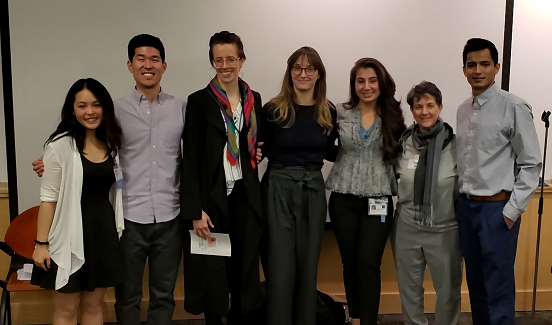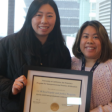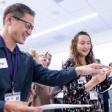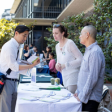
With a confident vision, Emily Silverman, MD, and Meghan O’Brien, MD, MBE, led a winter 2019 elective that empowered interprofessional students to organize a health humanities event series within just a few weeks.
“Meghan and I are both very interested in using arts and the humanities as tools to illuminate issues in health,” says Silverman, who is a physician, writer, and arts organizer, most notably for The Nocturnists, a live storytelling series (and podcast) that regularly sells out at the Brava Theater. O’Brien is a physician with a background in dance and bioethics who is dedicated to medical education, improving diversity, equity, and inclusion in medicine, and using humanities to amplify marginalized voices.
In the elective, their School of Dentistry, School of Medicine, and Physical Therapy students formed three interprofessional groups, each creating a public event through the lens of storytelling. Students quickly developed their narrative competency and project management skills through didactic sessions and frequent mentorship sessions with Silverman and O’Brien.
The resulting series of events focused on #MeToo, mental health, and end-of-life narratives and involved collaborations with UCSF and community partners, including the UCSF Psychiatry Interest Group, Richmond Multi-Area Services, National Alliance on Mental Illness, Mental Health Association of San Francisco, UCSF PRIME (Program in Medical Education for the Urban Underserved), UCSF CARE Advocate Denise Caramagno, and Bay Area Women Against Rape. Through committed teamwork, students “became leaders in their communities,” says Silverman.
Nazineen Kandahari suggested #MeToo as a theme after remembering a side conversation at a seminar as an incoming medical student involving a few trainees who were talking about how to manage sexual harassment in health institutions. “I brought up the idea of #MeToo as an event to create a space to honor voices, where people can feel safe to hear and learn from others and offer support,” says Kandahari, who is part of the UC Berkeley-UCSF Joint Medical Program.
Kandahari’s group promoted the event to all health professions at UCSF and to Bay Area health institutions. Word of the event spread online, and soon, Kandahari was receiving emails from people at medical schools across the nation who were also invested in organizing forums around #MeToo in medicine.
Through course conversations, the scope of the event became more action-oriented. “I started to think, ‘Beyond sharing stories of gender-based aggressions, let’s motivate people to change the culture and systems,’” she says. Her group partnered with Bay Area Women Against Rape and brought in Caramagno to discuss the Title IX process and how people can advocate for change and increase awareness at UCSF and all academic health institutions.
“Hearing the survivors’ stories was a powerful experience," says Caramagno. "I especially appreciated how survivors’ voices were centered in a way that recognized the diversity of their experiences and the commonality too. One opportunity to advocate for change within UCSF would be to join or collaborate with the Gender Equity Taskforce, a group of students and other trainees who are working to abolish sexual harassment on our campus. For those interested in supporting survivors in the community, SFWAR offers opportunities for volunteering and awareness raising. I would also encourage people to subscribe to the UCSF CARE listserv or check out the UCSF CARE web page in order to stay apprised of current issues and upcoming events.”
Yue-Ting Kara Lau was part of the end-of-life narratives group and had a similar experience as Kandahari in growing an idea into a profound event experience. She says, “I’ve always been very interested in the humanities, and writing in particular. Storytelling fits in with health care as well as with realms of science. At its core, storytelling is what drives discovery and why we’re interested in things, and how we approach what we value and choose to be curious about.”
Lau’s mother is an end-of-life physician, and Lau wanted to spotlight stories of patients with terminal illnesses to open up conversations about death and dying. Her group created an interactive space presenting objects donated by patients, patient families, and provider teams – a scarf, perfume, a wedding video, a miniature bike, a unicorn headband – accompanied by a patient story. Attendees were invited to touch the objects and respond to the item and narrative in a written card. Cards were then returned to the patients or people who donated the object as a way to respond to and acknowledge the patients’ stories. From her initial idea to the final group output, Lau says, “It grew beyond us to be everything we ever hoped for.”
All of the events had strong attendance and were warmly received by audiences. The student organizers are enthusiastic about what they learned from Silverman and O’Brien as well as their interprofessional peers, and many intend to carry their narrative project programming skills forward.
Lau says, “Everyone brings a different perspective. There’s a lot of value in having more humanities courses, given how important storytelling is in the narrative of a patient’s history and visit. This is a passion for me.”
Silverman and O’Brien would like to bring a greater humanities presence to UCSF. O’Brien says, “The elective was really special and the students who participated are using the skills to continue building community around health-related themes and are standing out as leaders in their class. It’s very gratifying to see the reverberating impact this elective has made, and we are so grateful for the support.”
They are interested in developing the experiential learning-based elective into a more robust program, such as a fellowship, but funding support is needed. As the only UC campus that does not offer undergraduate education, UCSF lacks the departments of English, philosophy, art, and social sciences that enable other universities to have a robust health or medical humanities program.
Silverman and O’Brien received a 2018 Innovations Funding for Education Grant (jointly funded by UCSF Academy of Medical Educators, UCSF Library, and the Program for Interprofessional Practice and Education) for the elective and had involvement from Jeanette Cavano, PharmD, and advisors Louise Aronson, MD, MFA, Rosalind de Lisser, NP, Amber Fitzsimmons, PT, MS, DPTSc, and Sophia Saeed, DMD.



